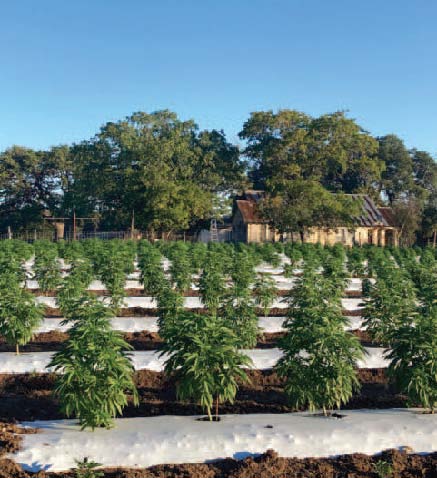When the Texas legislative session ended on June 2, a bill that would outlaw hempderived consumables containing THC and many other cannabinoids landed on the desk of Governor Greg Abbott. It was supported by Lieutenant Governor Dan Patrick, who called it one of the most important pieces of legislation he had ever backed. But on June 22, at the 11th hour, Abbott vetoed Senate Bill 3 (SB3).
For two local businesses in the Dripping Springs area, it was an unexpected and welcome reprieve.
Aaron Owens, of Tejas Hemp and Tejas Tonic, produces both gummies and beverages that have THC as an active ingredient. He said that if the law had passed, he would have had to make significant changes in the way he operates.
“It would have definitely taken my ability to put the very small amounts of natural THC that we put into these products. And I would say that 98% of everything in the market would have disappeared,” Owens said. “But I would not have. I would have focused on some of the other beneficial assets that are in the plants, like the essential oils, and I would have just focused on creating a compliant product from my Texas grown hemp.”
It would have been a different story for the Haus of Jayne.
“We would have had to shut our doors,” said co-founder Christy Spanton. “And depending upon what special session does, we're still uncertain if we will be able to stay open and in business.”
The special session of the Texas Legislature began on Monday, July 21. The hemp debate is one of the key issues to be addressed. In his veto, Abbott expressed concerns that SB3 would face a drawnout court battle, and he called on the Texas Legislature to instead come up with a law that could go into effect this year.
“Texas must enact a regulatory framework that protects public safety, aligns with federal law, has a fully funded enforcement structure, and can take effect without delay,” Abbott’s statement read.
Abbott suggested that a structure similar to that of alcohol regulation, overseen by an agency like the Texas Alcoholic Beverage Commission, would be an option. Patrick, who said he was blindsided by the veto, disagreed during remarks he gave in a press conference on June 23.
“The best way to protect adults and children is to ban the product,” Patrick said. “You cannot regulate eight to nine thousand locations.”
Both Owens and Spanton say they would be in favor of regulations that operate more like the alcohol industry does.
“In any unregulated market, you're gonna have unforeseen consequences - that later are the folks that people point their finger at, and call bad actors,” Owens said. “It's just the way it is. Because it's unregulated.”
He said that SB3 was an attempt to protect people from these bad actors.
“They thought that they needed to ban all hemp derived THC in order to achieve that,” Owens said. “And that's just not true.”
Owens said that when the House was considering the bill, they heard testimony from people all over Texas who shared how THC products were benefitting them.
“The reality is that the people of Texas have spoken,” Owens said. “You had hemp advocates. You had the veterans. You had every form of group you can imagine coming forward to stand up and say, hey, this is actually helpful. We're not drinking as much, or at all, our suicide rates have gone down, our mental health has gone up.”
Owens attended hearings on both the Senate side and the House side.
“It was crazy. I sat in there for 12 hours to speak for 60 seconds. And I wasn't the only one,” Owens said. “That went on for like 18 hours. It just was insane. And so when the House heard all that, it became very obvious that, you know, this prohibition is not the way. Regulation is the way.”
Owens said the House came back and added a committee substitute to SB3, which was their attempt at responsible regulation. However, when it went back to the Senate, they added another amendment which essentially took it back to a ban bill.
“And that's why SB3 passed with the amendment of the ban instead of the regulatory language,” Owens said. “It went to prohibition instead of regulation, and that is what the governor was facing when he had to make his decision.”
Owens said that’s also when the hemp industry and advocacy groups came together for a final push.
“One hundred and fifty thousand people signed a digital petition,” Owens said. “There were almost 10,000 handwritten letters delivered to the governor's office and countless emails and phone calls made to the governor's office pleading to not sign this bill, but to veto it.”
Both Owens and Spanton said they were thankful that the governor did just that, and they are hopeful that legislators can agree on smart regulation during the special session.
“We've become pivotal in our community. We have many awards throughout Austin and here in Dripping Springs just for our service and education,” Spanton said. “You have cancer patients walking through our door. We have our elderly and our sober community, who we are so passionate about, who come in here every day. We have people walking in here for sleep, pain, anxiety, you name it, across the board.”
She said Haus of Jayne also serves people who, like herself, qualify for the Texas Compassionate Use Program (TCUP) but can’t afford it, because they are on fixed incomes and the program is “astronomically expensive.”
“In this special session I really hope that we can take the politicking out of it, in all honesty, and sit here and look at what's fundamentally needed for those in our community, for all Texans,” Spanton said. “It’s smart regulation, not banning.”
Spanton said a ban would compromise all the businesses that have been built in good faith based on past legislative sessions. Owens agreed, and said he is also hoping for smart regulation, and not prohibition.
“How'd that work in the 20s for alcohol? You know? It doesn't work,” Owens said. “It would have forced everybody back underground, created a bunch of crime, made a bunch of criminals out of people like myself. You're gonna let me get eight years in and then tell me that I can't do it anymore?”
Owens, who is headquartered in Dripping Springs and has a farming operation in Luckenbach and a warehouse in Wimberley, said the number one thing the legislature needs to do is require all products to come from a plant.
“My opinion is we should have farming, and farming is plants, and then from plants you make oils that turn into products,” Owens said. “And what I can tell you is that these other products that are out there… they don't come from that supply chain.”
Owens said that Delta 9 THC is the only kind of THC that has ever come from the plant. The rest come from a laboratory, and are synthetics.
“What I can tell you is that Tejas Hemp and Tejas Tonic have always been and will always be an all natural, organic, plant-grown, plant-source product,” Owens said. “That's what I can say about myself.”
Owens said that the Texas hemp industry employs about 55,000 people, and includes about 8,000 licensees and $8 billion dollars worth of industry, so a lot of people’s livelihoods were on the line in June.
“It got a little touch and go there, a little stressful, a little bit emotional,” Owens said. “But in the end, it's just real hats off to Governor Abbott and honestly, the House of Reps and a portion of the Senators. They really listened to people and they really held it down. We’re very grateful right now - just grateful to be here and be entering what we hope to be a responsibly regulated space, which is what I think is going to happen.”
Owens said he’s also grateful to the Drippings Springs community, which he has called home for 13 years.
“I feel like I'm surrounded by positive people that are paying attention and that are moving forward with reality, and that reality is that hemp is safe and can be safe and they're all for it,” Owens said. “I love Dripping Springs and I'm super grateful for everybody around here, and they all have supported myself and my business from day one. I'm really tickled about that.”

Farmer Aaron Owens grows the plants he uses to make his Tejas Hemp products. CONTRIBUTED PHOTO
.png)










